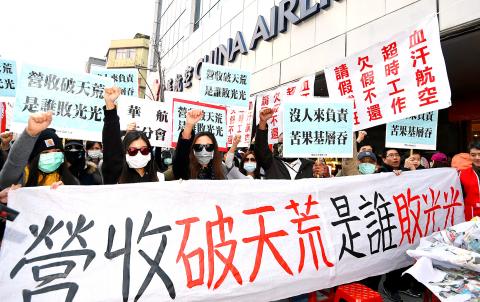Nearly 1,000 China Airlines (CAL) employees yesterday took to the streets outside the company’s offices in Taipei to protest a cut in their year-end bonuses, saying that the “insultingly low” bonuses failed to reflect the company’s annual revenue.
The protesters said that China Airlines plans to give its employees a flat year-end bonus of NT$20,000 (US$633) and raises of 2.5 percent, refuting the company’s claims that its employees received NT$45,000 each in year-end bonuses — which the employees said included funds from their own pockets that went to employee benefit committees.
Although representatives from China Airlines said that the year-end bonuses were finalized through negotiations with the China Airlines Employees’ Union, members of its Third Branch — mostly flight attendants — voted against the union’s decision and accused its leaders of “selling out.”

Photo: Chang Chia-ming, Taipei Times
Scores of flight attendants, pilots and mechanics said that the union’s leaders should step down, asking the organization’s parent body, the Taoyuan Confederation of Labor Unions, to assist in the matter.
The protesters said that given China Airlines raked in annual revenue of NT$149.8 billion last year — the second-highest total in the company’s history after NT$153.7 billion in 2010 — their year-end bonuses prompted questions about the company’s management policies, adding that the welfare of employees should not be sacrificed as a result of inept managerial decisions.
Despite the chilly temperature in Taipei yesterday evening, the protesters congregated in front of the company’s offices, setting up a stage and occupying two lanes of Nanjing E Road while raising placards and chanting slogans.
As the rally was jokingly referred to as a “year-end dinner,” a raffle was held and rice noodles with soup were served to the protesters.
Protesters said that tensions escalated over the past week amid warnings that employees found to have participated in protests or petitions would be punished by the company, adding that they might be subject to interviews by managers and suspended from work.
A labor union leader from the Third Branch, who spoke on condition of anonymity, said the company insisted that only “a small minority” of employees were dissatisfied and that leaders of the protests were “dissidents.”
She said that it was unbelievable that the company would use such “archaic language” in a bid to prevent their employees from making their voices heard.
Taoyuan Confederation of Labor Unions member Lin Chia-wei (林佳瑋) urged the employees to stand their ground.
“The company has suggested that protesters might be suspended from flights,” Lin said.
“Let us see if they have the ability to remove 1,000 employees from service,” she added.
The employees also said their year-end bonuses were all the more unacceptable given the “sweatshop-like” labor conditions that airline employees endure.
One pilot said that China Airlines should have no excuse for low profits, as it only employs three pilots per shift instead of four.
Some flight attendants said they were always required to work shifts immediately after they took a day’s leave, regardless of their health.
A China Airlines spokesperson said it is treating the issue seriously, adding that employees received an average of two to three month’s salary for their year-end bonuses.

Alain Robert, known as the "French Spider-Man," praised Alex Honnold as exceptionally well-prepared after the US climber completed a free solo ascent of Taipei 101 yesterday. Robert said Honnold's ascent of the 508m-tall skyscraper in just more than one-and-a-half hours without using safety ropes or equipment was a remarkable achievement. "This is my life," he said in an interview conducted in French, adding that he liked the feeling of being "on the edge of danger." The 63-year-old Frenchman climbed Taipei 101 using ropes in December 2004, taking about four hours to reach the top. On a one-to-10 scale of difficulty, Robert said Taipei 101

Nipah virus infection is to be officially listed as a category 5 notifiable infectious disease in Taiwan in March, while clinical treatment guidelines are being formulated, the Centers for Disease Control (CDC) said yesterday. With Nipah infections being reported in other countries and considering its relatively high fatality rate, the centers on Jan. 16 announced that it would be listed as a notifiable infectious disease to bolster the nation’s systematic early warning system and increase public awareness, the CDC said. Bangladesh reported four fatal cases last year in separate districts, with three linked to raw date palm sap consumption, CDC Epidemic Intelligence

Two Taiwanese prosecutors were questioned by Chinese security personnel at their hotel during a trip to China’s Henan Province this month, the Mainland Affairs Council (MAC) said yesterday. The officers had personal information on the prosecutors, including “when they were assigned to their posts, their work locations and job titles,” MAC Deputy Minister and spokesman Liang Wen-chieh (梁文傑) said. On top of asking about their agencies and positions, the officers also questioned the prosecutors about the Cross-Strait Joint Crime-Fighting and Judicial Mutual Assistance Agreement, a pact that serves as the framework for Taiwan-China cooperation on combating crime and providing judicial assistance, Liang

US climber Alex Honnold left Taiwan this morning a day after completing a free-solo ascent of Taipei 101, a feat that drew cheers from onlookers and gained widespread international attention. Honnold yesterday scaled the 101-story skyscraper without a rope or safety harness. The climb — the highest urban free-solo ascent ever attempted — took just more than 90 minutes and was streamed live on Netflix. It was covered by major international news outlets including CNN, the New York Times, the Guardian and the Wall Street Journal. As Honnold prepared to leave Taiwan today, he attracted a crowd when he and his wife, Sanni,